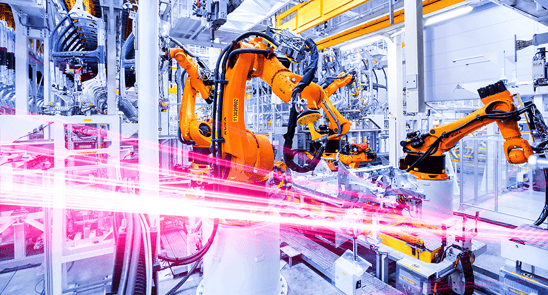
The automotive industry is at the forefront of adopting the latest technology while still remaining cost efficient. Naturally, artificial intelligence (AI) has become ubiquitous as more and more companies adapt to Industry 4.0. According to CIO.com, the compound annual growth rate (CAGR) of AI is expected to be a whopping 40% through 2025. And automotive AI is projected to grow to be worth $12 billion by 2026.
As manufacturers continue to innovate, how can AI help usher in the future of the automotive industry?
1. Autonomous Vehicles and Driver Assist
One area where AI affects the automotive industry is in the vehicles themselves. New cars and trucks are becoming equipped with driver assist features, from Hyundai’s Smart Park, which parks a car without any assistance from a driver, to automatic braking, drowsiness detection, and more.
Manufacturers and partners are also working to create AI-driven systems to power self-driving cars and trucks. The way that AI functions in automated vehicles and those equipped with driver assist is by using dozens of sensors that respond instantly to potential danger by taking critical actions like warning the driver, taking control of the car or truck, or braking automatically.
2. Connected Vehicles
A connected car is one that can communicate with outside systems and exchange data. In order to work smoothly, an AI-powered vehicle must be connected with other systems outside of it via the internet.
The AI within a connected vehicle can not only be helpful, but also potentially life-saving. An intelligent car can predict potential component failures and alert drivers when one is detected, preventing potential safety issues and cutting down on repair costs for the consumer by enabling them to fix a problem before it escalates.
3. Manufacturing
AI has had a significant impact on auto manufacturers. Although AI in manufacturing can dredge up the mental image of robots replacing human workers, developments in recent years have been much more beneficial — one of the most notable advances in AI has been the rise of robots who work in tandem with, rather than instead of, people working on an assembly line.
These robots use a facet of AI called machine learning — which gathers information much like a person would — to learn patterns, but at an exponentially faster rate. In a fraction of the time it would take to teach a human, these machines grow to understand how people work and can work to prevent injury in manufacturing plants. They can also create schedules to improve efficiency and streamline workflows, as well as easily find defects in auto parts, which reduces cost and production downtime while delivering a more cohesive final product to customers.
4. Quality Control
The benefits of AI aren’t limited to predictive maintenance. Machine learning can also improve quality control. By studying parts and products using machine learning, machines can:
- Calculate remaining warehouse space to determine the best loading and product storage areas
- Automate the loading process
- Check the quality of products before they reach the warehouse
- Automatically count equipment such as crate lifts
5. Supply Chain
Automotive manufacturers can have supply chains on a complex and global scale — and breakdowns throughout these chains can be costly. AI can help manufacturers maintain control of their supply chains, from planning and logistics to inventory management and tracking.
To reduce costs — and the potential of supply chain breakdown — AI can predict interactions between units and automate new requests for parts, labor, repairs, and more.
In recent years, AI has had a significant impact on automotive manufacturers. And as more manufacturing plants adapt to Industry 4.0, AI will be a driving force in the future of the automotive industry. From self-driving cars to improvements in manufacturing, supply chains, and quality control, AI inspires greater efficiency and safety for manufacturing plants.
Rittal is at the forefront of Industry 4.0 innovation for the automotive industry. Learn more about Rittal’s Automotive Solutions, including our NEMA-rated enclosures and our power distribution and climate control solutions.

